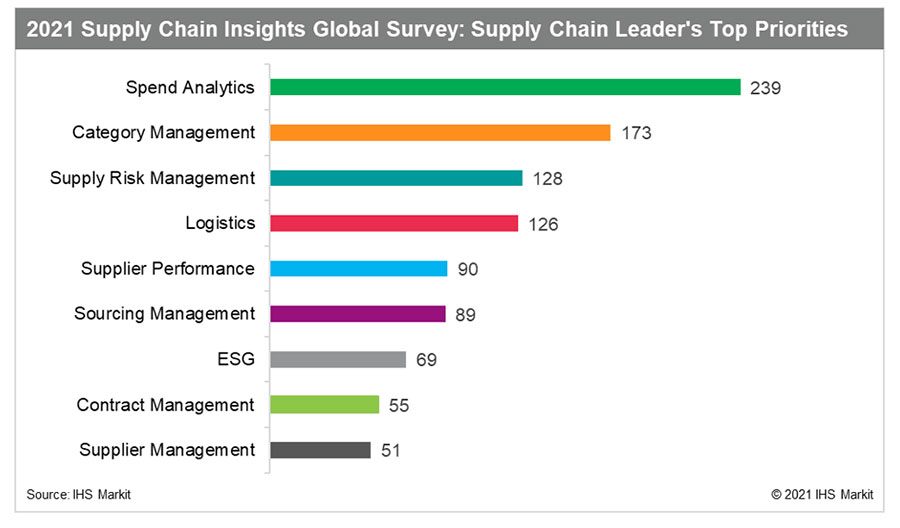As reported in SCMR, events of the past year have upended the procurement industry, illustrating the fragility of a complex international supply chain and forcing a sea change in the industry.
However, according to the 2021 Supply Chain Insights Global Survey from IHS Markit, supply chain managers often lack the tools, data and platforms needed to diversify their supply chains and optimize their processes.
“Supply chains can no longer operate as siloed, disconnected functions; recent events such as the COVID-19 pandemic and the Suez Canal saga, have illustrated the need for supply chains to be resilient and agile,” said Wilhelm Greyling, executive director, supply chain solutions, IHS Markit. “Supply chains can only truly be optimized via end-to-end collaboration and visibility. As the old saying goes, you can’t manage what you can’t see; an integrated approach is not only a nice to have, its essential.”
Conducted earlier this year, the 2021 Supply Chain Insights Global Survey asked respondents to identify their priorities and capabilities in three key industry capabilities: strategy and process, platforms and technology and intelligence, insight and expertise across nine functional elements. Responses were compiled from 340 supply chain leaders across 60 countries and 33 industries.
While respondents noted prioritizing spend analytics and reported having a strategy in place to optimize costs, 63 percent lacked the necessary data, platforms and technology needed to make critical cost-saving decisions. The results represent a clear misalignment between strategic intent and capability and send a signal that significant investment is needed in technology, platforms and data to enable and deliver overall supply chain objectives.
Surprisingly, supplier risk management and ESG were prioritized as among the least important considerations, at nine and seven, respectively.
Gartner analysts told SCMR that ESG stands for Environmental, Social, and Governance.

“Investors are increasingly applying these non-financial factors as part of their analysis process to identify,” the analyst added.
Only 51 percent of supply chain leaders surveyed reporting having a strategy in place to combat ESG issues.
“Increasing legislation and regulation will continue to drive the importance of third-party risk management and ESG considerations, as companies increasingly become accountable not only for their own actions, but also for that of their suppliers,” said Greyling. “The reluctance in investment into the areas of third-party risk and ESG could easily wipe out a firm’s cost-optimization gains, as the penalties for oversights or breaches can be severe.”
The survey results signaled that in today’s world of complex supply chains, one missing link can have drastic cost and reputational benefits. Successful supply chains of the future will need to balance precise cost optimization strategies with a proactive approach to risk management and ESG considerations.
SC
MR


Latest Supply Chain News
- How S&OP provides the answer to in-demand products
- AI, virtual reality is bringing experiential learning into the modern age
- Humanoid robots’ place in an intralogistics smart robot strategy
- Tips for CIOs to overcome technology talent acquisition troubles
- There is still work to do to achieve supply chain stability
- More News
Latest Podcast

 Explore
Explore
Business Management News
- How S&OP provides the answer to in-demand products
- AI, virtual reality is bringing experiential learning into the modern age
- Tips for CIOs to overcome technology talent acquisition troubles
- There is still work to do to achieve supply chain stability
- Blooming success: The vital role of S&OE in nurturing global supply chains
- Supply chain salaries, job satisfaction on the rise
- More Business Management
Latest Business Management Resources

Subscribe

Supply Chain Management Review delivers the best industry content.

Editors’ Picks





